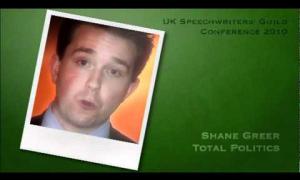Speechwriters: We’re natural lunatics, but to be better public speakers, we have to rehearse
April 25, 2011
Last week on a spring break vacation in Ft. Myers Beach, Fla., I read the annual collection of the Best American Essays to see what great things were written while I was busy trying to write great things myself.
Reading the paperback anthology, I usually feel like a lucky thief, stealing the best work out of magazines—from the American Scholar to The Wilson Quarterly—that I don’t subscribe to. Sometimes, though, I feel like a befuddled goalie, such as when I ran across a short piece titled “When Writers Speak,” which appeared last year in a publication I do read—The New York Times book review. How could I have missed this?
“Like most writers, I seem to be smarter in print than in person,” writes Aurthur Krystal.
In fact, I am smarter when I’m writing. I don’t claim this merely because there is usually no one around to observe the false starts and groan-inducing sentences that make a mockery of my presumed intelligence, but because when the work is going well, I’m expressing opinions I’ve never utterd in conversation and that otherwise might never occur to me. Nor am I the first to have this thought, which naturally occurred to me while composing. according to Edgar Allen Poe, writing in Graham’s Magazine, “Some Frenchman—possibly Montaigne—says: ‘People talk about thinking, but for my part I never think except when I sit down to write.'” I can’t find these words in my copy of Montaigne, but I agree with the thought, whoever might have formed it. And it’s not because writing helps me to organize my ideas or reveals how I feel about something, but because it actually creates thought, or at least supplies a petri dish for its genesis.
My dad, who enjoyed a small but rabid following among readers of a an automobile magazine he wrote for, did not enjoy the occasional invitations to give speeches to his fans, because he knew, as he dreadingly put it, “I can’t give them what they want.”
For the entire first decade of my career, I staggered through most of my public-speaking appearances because I considered public speaking an inferior art to writing, and unworthy of a writer’s rehearsal time. It only took a couple dozen minor debacles to learn that if I don’t rehearse a lot, I make an ass of myself.
I’ve put hundreds of writers in front of big audiences at communication conferences. I’ve heard many of them brag in the bar the night before, about having put the presentation together on the airplane. And I’ve watched them bomb. You know what kinds of writers generally don’t make that mistake? Speechwriters, who know better.
People like Mark Twain were lucky enough to have two separate skills—writing, and speaking—that go nicely together. And by “people like Mark Twain,” I mean “Garrison Keillor.”
As for the rest of us—well, I’ll let Arthur Krystal finish my point:
… when the German naturalist Alexander von Humboldt told a friend, a Parisian doctor, that he wanted to meet a certifiable lunatic, he was invited to the doctor’s home for supper. A few days later, Humboldt found himself placed at the dinner table between the two men. One was polite, somewhat reserved, and didn’t go in for small talk. The other, dressed in ill-matched clothes, chattered away on every subject under the sun, gesticulating wildly, while making horrible faces. When the meal was over, Humboldt turned to his host. “I like your lunatic,” he whispered, indicating the talkative man. The host frowned. “But it’s the other one who’s the lunatic. The man you’re pointing to is Monsieur Honoré de Balzac.”
Later this week, I’ll share here what I have learned about how a writer ought to prepare for a speaking engagement. Meanwhile, dear writer: Can you spiel thyself? —DM


